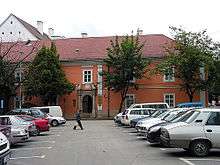Jesuit Academy of Cluj
| Jesuit Academy of Cluj | |
|---|---|
|
Native name Latin: Academicum Claudiopolitanum Societatis Jesu Collegium | |
 The Jesuit Church and the Academy (historical picture) | |
| Type | Built as Jesuit College |
| Established | 1581 |
| Founder | Society of Jesus (Jesuits) |
| Original use | Seminary, university and observatory |
| Current use | Parish church, Public high school, Cultural Center |

The Jesuit Academy of Cluj was founded in 1581 by King Stephen Báthory, prince of Transylvania and king of Poland. He called to Cluj seven Jesuit professors from Italy, Germany, and Poland, who constituted the Collegium Academicum Claudiopolitanum. The first rector of the college was the Polish Jesuit priest Jakub Wujek.
The Jesuits were banished in 1603, and in 1698 they came again after the restoration of the academy. The institution experienced a special momentum in the 18th century, when a large boarding school, called Convictus Nobilium, was built next to the church and university, where students were received regardless of their ethnic origin.
History
The founding document of the Academic College in Cluj was issued by King Stephen Báthory in Vilnius on 12 May 1581. The steps for setting up this college were taken by Italian diplomat Antonio Possevino. The first academic rector of the college was Jakub Wujek, a philologist who had previously been the first rector of the newly established University of Vilnius.[1] The University operated during this first period near the Church on Uliţa Lupilor. For funding the University of Cluj was granted the income of the Monastery of Cluj-Mănăştur, with six villages.
The institution numbered more than 180 students in 1585.[2] In 1603, in the context of occupying the city by Moses Székely, the Jesuits were expelled, their goods devastated, and the university closed.[3]
The Vienna Court restored the university on November 17, 1698. From 1725, the rector of the institution was empowered to hold the title of rector magnificus.[4]
In 1713 there arose the Fundatores Academiae Transsilvaniae Claudiopoli, a work for foundations of the higher education in Cluj.[5]
Teaching Staff
The Jesuits Academy in Cluj had seven teachers, to which the rector was added. Among the professors was Maximilian Hell, the head of the mathematics department, who set up the first astronomical observatory in Cluj .
In 1776, after the suppression of the Society of Jesus, Empress Maria-Theresa laid the foundations of a German university in Cluj, a university dedicated to the outlawed Jesuits . They were unable to maintain the previous scientific level, so the academy became just a high school, where teaching was again in Latin .
See also
References
- ↑ Venczel Biró, A Kolozsvári jezsuita egyetem, Kolozsvár-Cluj, 1945, pag. 5.
- ↑ Ștefan Pascu (coordonator), Istoria Clujului, Consiliul Popular al Municipiului Cluj, 1974, pag. 147.
- ↑ Ștefan Pascu, Universitatea Babeș-Bolyai din Cluj, Cluj, 1972, pag. 8-9.
- ↑ Ștefan Pascu (coord.), Istoria Clujului, Consiliul Popular al Municipiului Cluj, 1974, pag. 227.
- ↑ Károly Erdély, A Kolozsvári R. Kath. Fögymnasium története (1579-1898), Kolozsvár, 1898, p. 62.
Coordinates: 46°46′3.74″N 23°35′25.88″E / 46.7677056°N 23.5905222°E